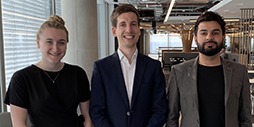
The programme
A bespoke secondment targeted at those working for policy/regulatory authorities in the domain of FinTech regulation and/or regulatory innovation.
Cambridge Centre for Alternative Finance (CCAF)
The Cambridge Centre for Alternative Finance (CCAF) is a multi-disciplinary research institute established within Cambridge Judge Business School, University of Cambridge. The CCAF is an internationally renowned centre of excellence, noted for its pioneering research in alternative finance: its benchmarking and industry reports are widely recognised as one of the most reliable, independent and comprehensive sources of information and market data in crowdfunding, peer-to-peer lending and other forms of alternative finance.
In addition to its industry focus, the Centre has developed leading programmes and initiatives in the regulation of alternative finance. This focuses on providing an evidence-base for policymakers and regulators in order to make more informed decisions on alternative finance/FinTech. The Centre works in collaboration with over 100 pioneering regulators, central banks, international standard-setting bodies, and other development partners. This includes the UK Financial Conduct Authority, the Inter-American Development Bank, the OECD, the Asian Development Bank Institute, the UK Department for International Development, and the World Bank.
A small sample of this includes:
- Regulating Alternative Finance: Detailing the global regulatory landscape on alternative finance, and regulatory innovation in partnership with the World Bank.
- Crowdfunding in East Africa: Identifying key priority regulatory and policy areas to support the market development of crowdfunding in East Africa, in partnership with FSD Africa.
- FinTech in Uganda: Identifying key priority areas necessary for regulatory and policy development in Uganda to address the challenge of facilitating responsible development of inclusive digital finance, in partnership with FSD Uganda.
- Cryptoasset Regulation: Providing the first global comparative study of cryptoasset regulation, conducted with the support of the Nomura Research Institute.
The CCAF has also developed a leading programme on the subject of regulatory innovation, that is regulators innovating in response to financial innovation. This includes leading research on initiatives such as regulatory sandboxes, innovation offices and RegTech. A small sample of this includes:
- Early Lessons on Regulatory Innovation to Enable Inclusive FinTech: providing early lessons learned and practical considerations from regulatory innovations to enable inclusive FinTech, in partnership with the UNSGSA FinTech Working Group.
- Guide to Promoting Financial & Regulatory Innovation: providing a guide to promoting financial and regulatory innovation, supported by the UK Foreign and Commonwealth Office (FCO).
Secondment focus: financial regulation
The FinTech Regulation and Regulatory Innovation Secondment Programme is targeted at those working on the subject of FinTech or regulation innovation, in a financial regulator, central bank or other relevant policy/regulatory authority.
Over the course of the secondment, successful candidates will work directly with the regulation team of experts at the CCAF in a dynamic, flexible research centre of excellence. They will support the CCAF’s programmes and initiatives on the regulation of alternative finance, including research, capacity building and education, and the development of digital tools. This will include working with the Centre’s network of influential collaborative partners across the world.
Outputs
The outputs of these will provide key data and insights to inform and enable the work and practice of alternative finance industry, investors, and policymakers and regulators, thereby facilitating market development and effecting evidence-based regulatory change.
Some examples of the work you may be involved with at the Centre include:
- Undertaking and publishing research which advances the global understanding of how to design and regulate alternative finance/technology-enabled financial innovation.
- Gathering and disseminating lessons learned and good practices on the regulation of alternative finance activities.
- Developing and delivering training and education programmes, both online and offline, on the subject of the regulation of technology-enabled financial innovation, in order to support regulatory capacity building in this field.
- Publicly representing the CCAF in international and regional fora and among key partners, including financial regulators and central banks, international standard setting bodies, government departments, universities, think tanks, and development partners.
- The opportunity to contribute to influential academic and research papers, as a named author.
The secondment is ideally a six to 12 month engagement, to ensure successful candidates can fully immerse themselves in the available research projects and reap the most that the programme has to offer in terms of experience, learning and skills. Flexibility with respect to duration can be offered.
Applicants that are looking for shorter-term, part-time paid work in this area may wish to instead apply to the FinTech Regulation and Regulatory Innovation Internship Programme or register their interest with Philip Rowan.
The candidate
What experience and skills do I need?
- Experience in FinTech and/or regulatory innovation.
- Demonstrable track record in conducting and delivering regulatory research.
- Ability to engage policymakers and regulators
- Experience and knowledge of working with/for a financial regulator/central bank/relevant authority ideally in a FinTech unit or function (e.g. innovation office/regulatory sandbox) would be beneficial.
- Analytical and research skills
- Effective organisational and project management skills.
- Strong communication and presentation skills.
- Fast learner with intellectual curiosity.
- Ability to take ownership and deliver on defined projects.
- Self motivated.
- Team player.
Coding and development or quantitative data analysis skills are not required for this position, although there may be opportunities to utilise them.
Becoming a secondee
- Selected candidates are expected to remain on the payroll of their home organisation.
- A secondment agreement and Memorandum of Understanding will be agreed between the CCAF and the home organisation. This will include policies with respect to HR, day-to-day operations and management, confidentiality and data protection.
- Candidates are expected to be based in either the CCAF’s offices in Cambridge in the UK, or in one of the CCAF’s Collaboration Network locations in Sub-Saharan Africa, the Middle East and North Africa, or the Asia-Pacific region.
Applications
Applications are accepted on a rolling-basis.
Queries
For For the questions of this programme, please contact the Lead of this programme Philip Rowan:


